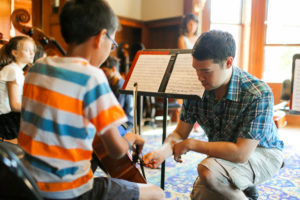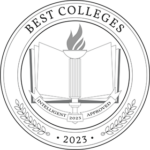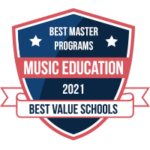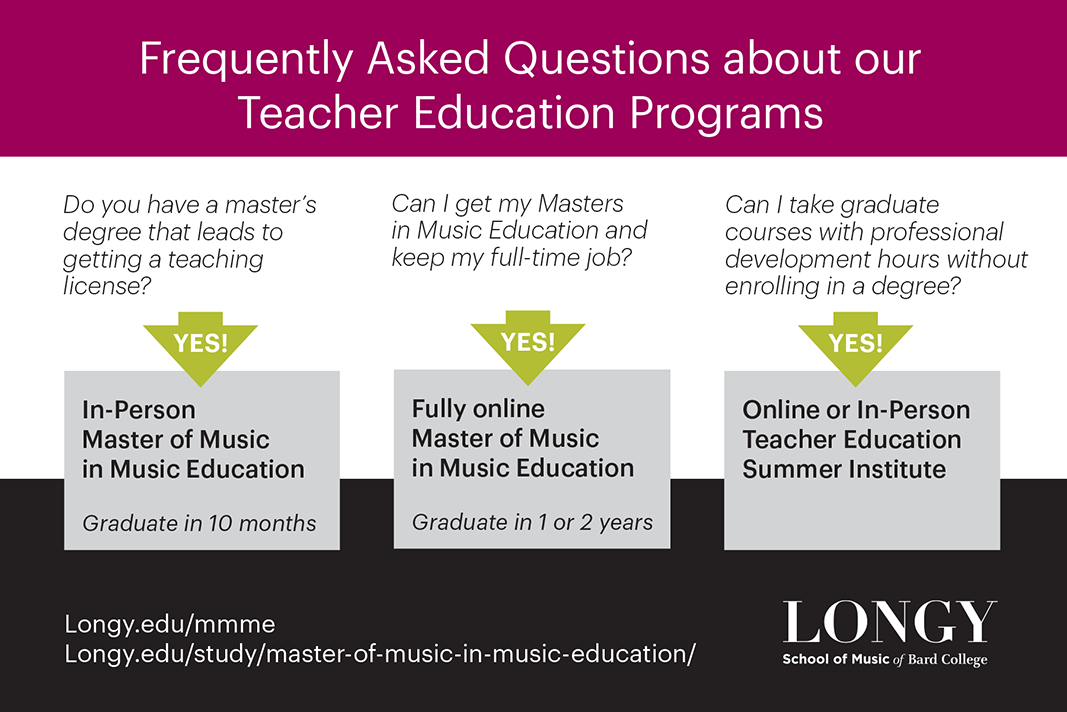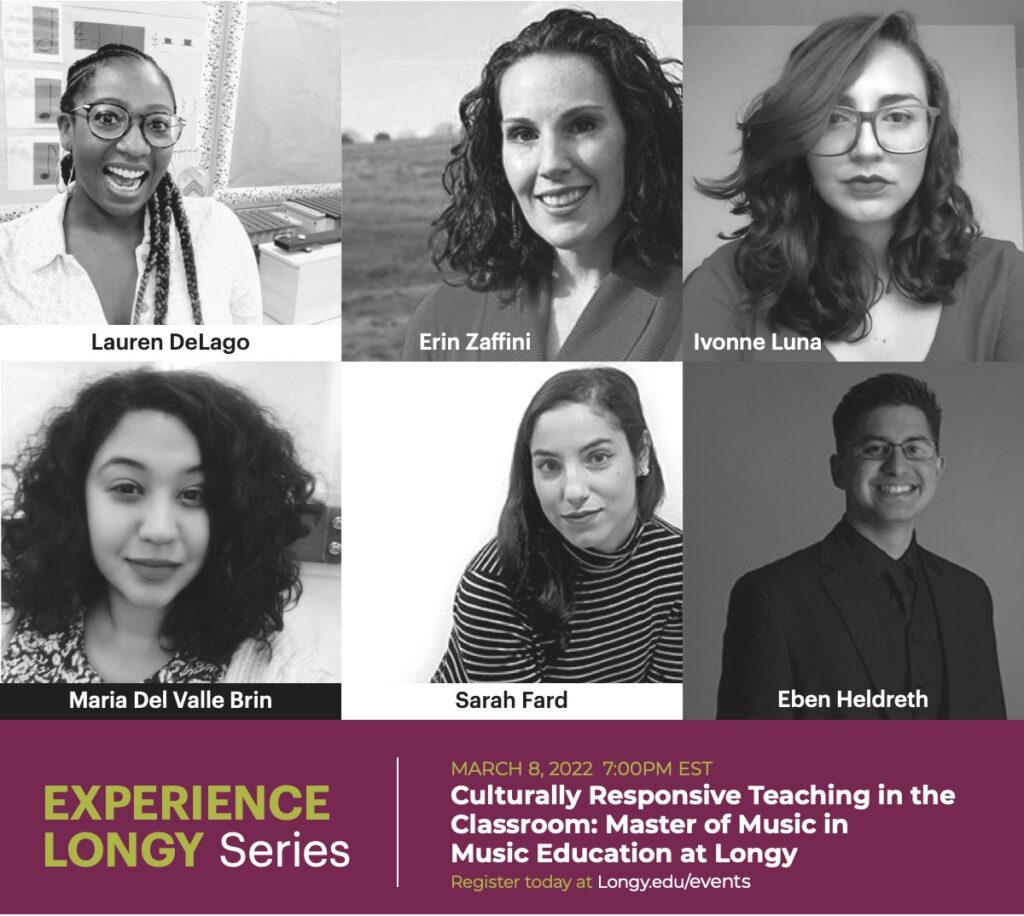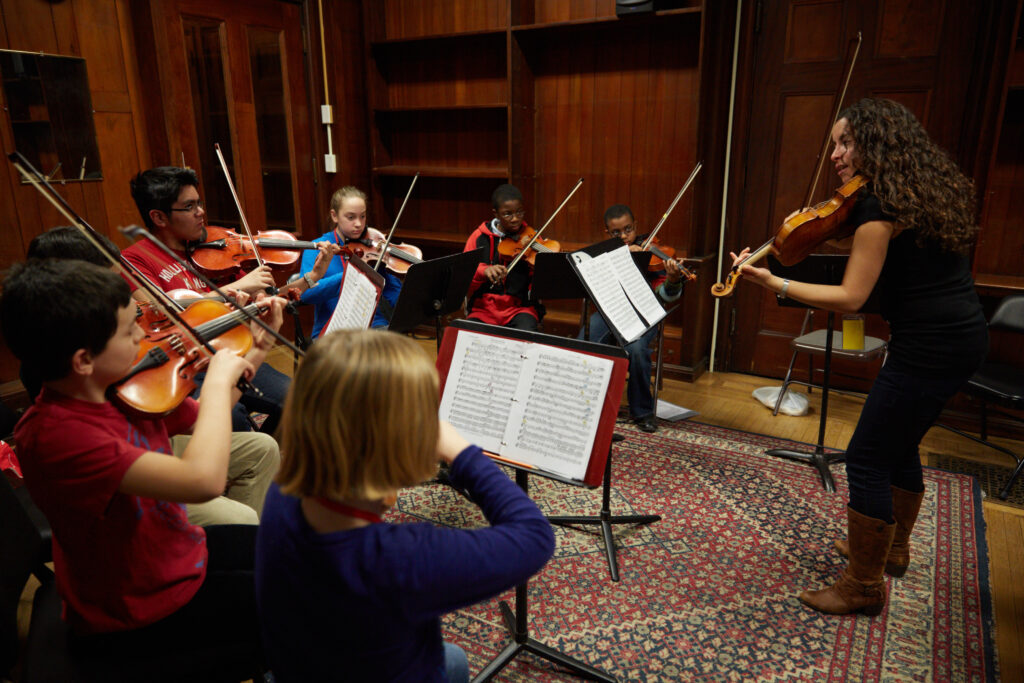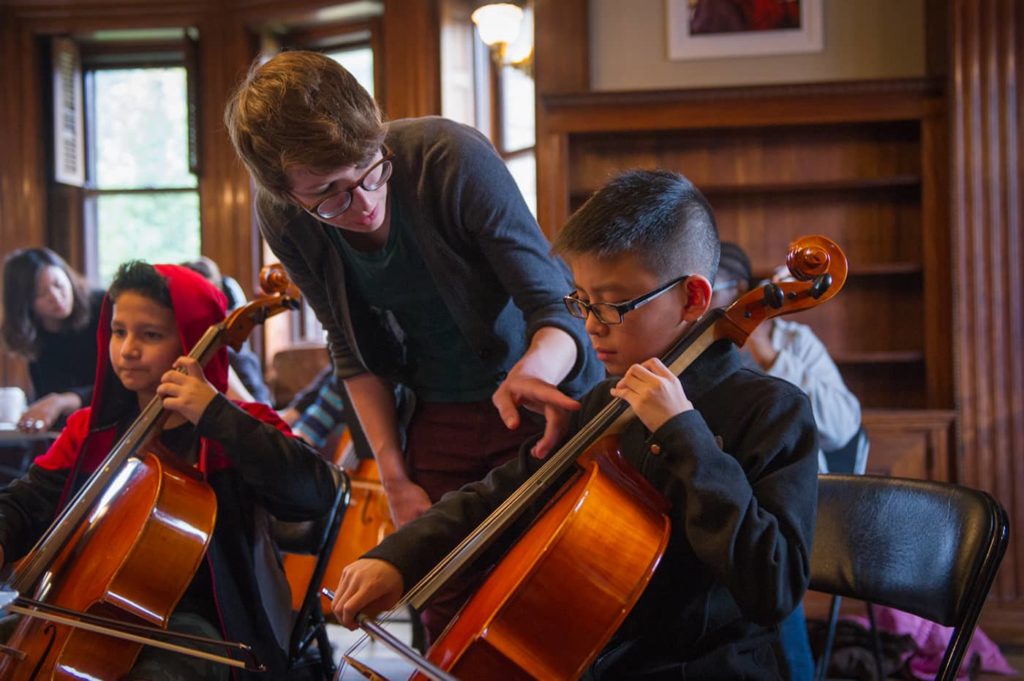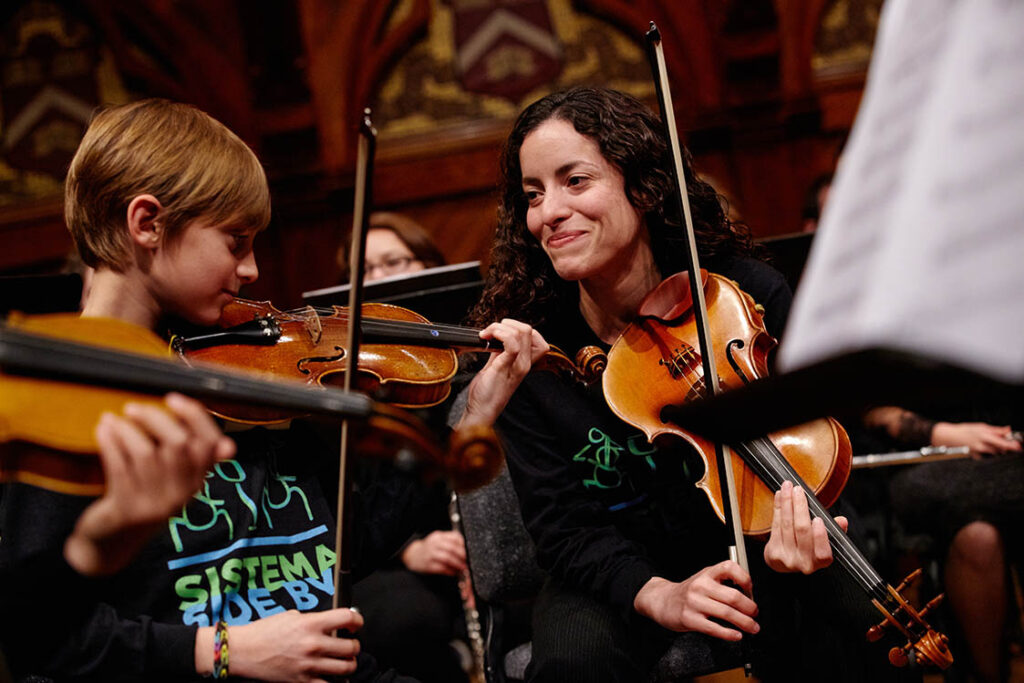Home / Study / Music Education Programs / Online MMME
Online Master of Music in Music Education

Become the educator the world needs you to be!
Still accepting applications for Fall 2024!
- Choose what’s best for you—get your Master’s in one year or two years
- Asynchronous classes—plan your studies around your life
- Financial assistance is available
- No auditions, no application fees!
The world needs more music teachers. That’s why Longy is committed to removing as many barriers as possible to a career in music education—including creating a Master of Music in Music Education Online program designed to fit your busy life. Whether you found music at 2 or 22, you can build a future in music education at Longy.
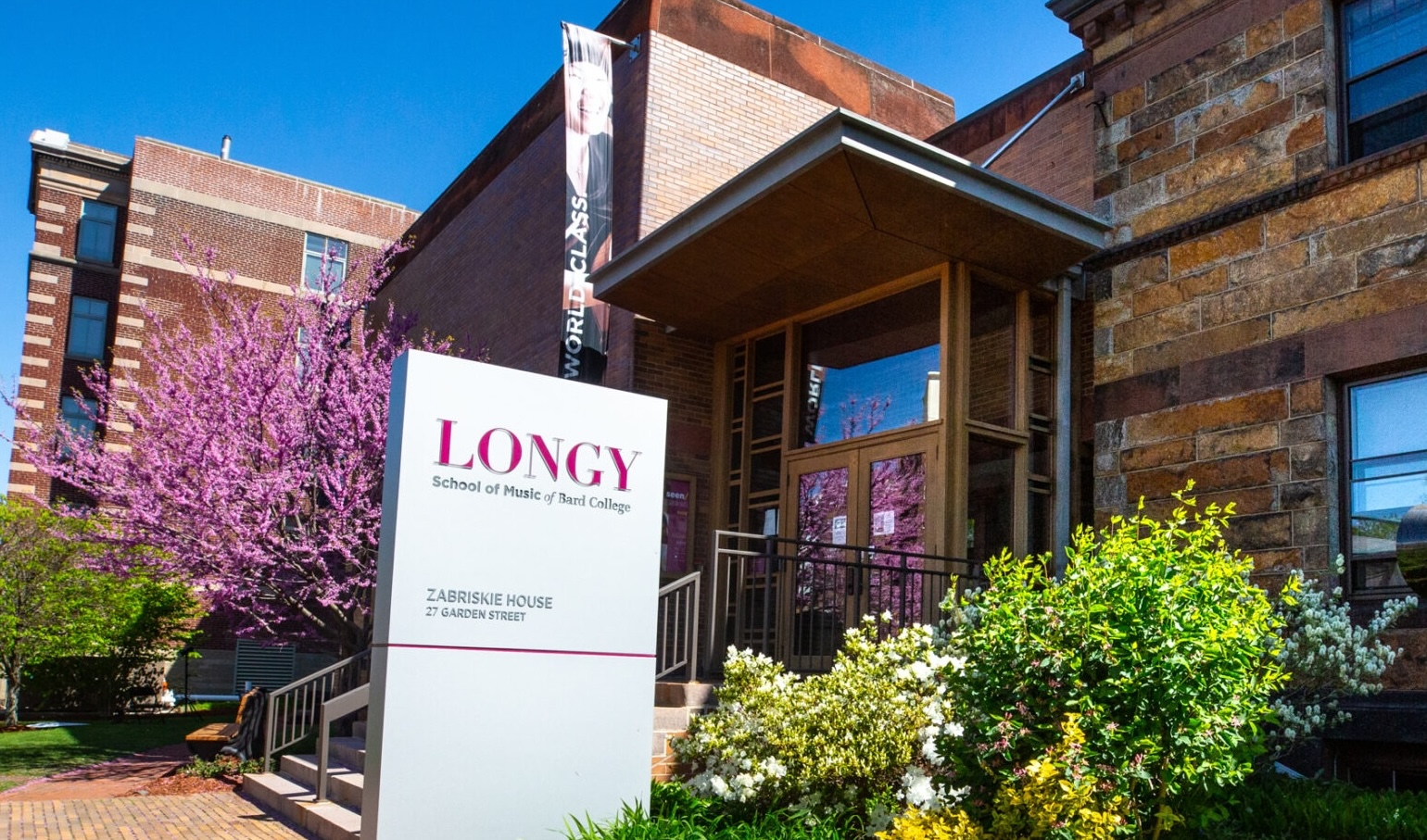
Designed with the Working Teacher in Mind
Longy’s asynchronous classes allow you to pursue an advanced degree without taking time off. Map out a learning schedule that fits your life, with the option to complete your degree in as little as one year. Don’t choose between work or an education—learn on your own terms.
Longy’s Teacher Education program is rooted in culturally responsive teaching.
-
-
- Build curriculum centered around students’ cultures and life experiences
- Engage your entire classroom—meet students where they are
- Create more equitable classrooms
-
Application Requirements
- Artistic Résumé
- Personal Statement
- Video of introduction explaining why you wish to attend Longy
- Two letters of recommendation
- Transcripts – all transcripts must be in English. Applicants must upload an unofficial copy of transcripts from prior undergraduate and/or graduate work as part of their online application for admissions. Official transcripts are required only after an offer of admission is made and accepted.
- English Proficiency Scores – for non-native English speakers only. Unofficial TOEFL, IELTS, or Duolingo English Test required for the application. Official scores are required only after an offer of admissions is accepted.
MMME Online Tuition
Longy pledges to work with you to reduce financial barriers through scholarships, financial aid, and other subsidies.
- Complete your degree in one year – $18,500 total (before financial aid/scholarships)
- Complete the degree in 2 years – $19,500 total (before financial aid/scholarships)
The tuition is the total cost of the degree – there are no additional fees! Pay-as-you-go options are available.
Are you a U.S. veteran? Longy’s MMME online program is VA-approved!
MEET FACULTY CHRISTOPHER SIERRA
Arts Engines with Aaron Dworkin
Culturally Responsive Teaching in the Arts
MEET ALUM MARIA DEL VALLE
Master of Music in Music Education Online '22
Music Director, WHIN Music Community Charter School
MM/ME Online Faculty
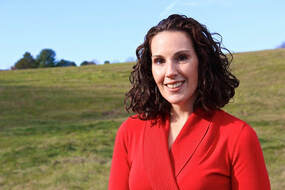
“ Every child is entitled to be inspired by positive musical experiences and to find a ‘home’ and connect with others through music. Just as our close community of music education faculty and students inspire others, we will prepare you to do the same for your future students—to influence their lives in ways you have always imagined. ”
Meet Erin Zaffini, Director of Teacher Education
Dr. Erin Zaffini (DMA, Boston University) is an adjunct music and music education professor at Keene State College, where she supervises student teachers, and teaches undergraduate music courses in general music education, music curriculum and assessment, and adaptive music. She is also a faculty member for the University of New Hampshire’s Professional Development Department, where she teaches in-service teachers how to integrate music and movement into their classroom, as well as teaches Early Childhood Music and Movement. In addition, she currently teaches K-5 general, vocal and instrumental music at Stoddard and Washington Elementary Schools in New Hampshire. She has taught preK-8 general music, choral music, instrumental music, hand bell ensemble, and musical theatre. She is an active clinician around the country, serves as the Eastern Division Representative for NAfME’s General Music Council, is the Collegiate Coordinator, General Music Chair and Mentor Program Coordinator for the New Hampshire Music Educators Association, and sits on the Advisory Committee for the Music Educators Journal. Dr. Zaffini is the project leader for instituting music educator mentor training within the Society for Music Teacher Education and the National Association for Music Education. She is the recipient of the Keene State College Excellence in Teaching and Excellence in Performance Awards. She has recently published articles in General Music Today, Music Educators Journal and Update: Applications of Research in Music Education.
Erin Zaffini,
Director of Teacher Education
MICHAEL GUTIERREZ,
Administrative Manager of Teacher Education
Ashleigh Cicconi
Heather Cote
Nicole Collins
KELLORI DOWER
Sarah Fard
LORRIE HEAGY
Eben Fernando Heldreth
Alysia Lee
Monique Van Willingh
Garo Saraydarian
Michael Coelho
Ryan Zellner
Why pursue your Music Education degree at Longy?
Longy’s fully online Master of Music in Music Education degree program (MMME) is designed especially for educators who seek an advanced degree without taking time off from their careers. The program, which can be completed in one or two years, builds on Longy’s decade of expertise in preparing musicians to be teachers through its campus-based degree programs, including the one-year degree offered in Cambridge, MA.
The program is uniquely designed to integrate practices of social change in the music classroom. Graduates of this program will be prepared to amplify the voices of students from all backgrounds, create and make music from diverse cultures, and approach music teaching from a holistic and equity-based perspective.
Teaching is much more than a profession; it is a calling. Today, more than ever before, music teachers are called to do more. We are called to be leaders, so that we may inspire others in the ways that we have been inspired. We are called to lift up the voices and experiences of all the young people in our classrooms. We are called to challenge ourselves to be better music educators for all our students and communities. We are called to reflect on our teaching experiences and take action to promote equity and understanding. We are powerful.
If those thoughts engage your sense of “why” you want to further your music teaching career, consider Longy as a path to get you there. The fully-online Master of Music in Music Education program is designed with practicing music educators in mind. Longy believes that you shouldn’t have to leave your teaching position to pursue the dream of earning a Masters of Music in Music Education degree, and that online learning is a perfect complement to your current practice in the field. With a focus on cultural relevance, access, equity and inclusion in pre-K-12 music education, the program’s curricula and faculty support all music educators from around the world to embrace their “why” and realize their dreams of making a bigger, more socially-concious impact, one student at a time. There is no time better than the present to turn your “why” into “why not?” Let us give you the tools to help you get there! We look forward to welcoming you into our community!
Course Highlights
Socially Relevant and Culturally Responsive Teaching
Grounded in educational equity and diversity, learn to carry these principles over to your curriculum and school practices for all students. Learn how to provide equitable access to your core curriculum and maximize academic achievement—for students from all ethnic, race, socio-economic, cultural, academic, linguistic, and other backgrounds.
Non-Traditional Ensemble Arranging
Learn non-traditional approaches to ensembles in a K-12 classroom—to ensure access and inclusion for students who wish to pursue performance opportunities beyond standard offerings. Focus on arranging music for the students in your room, while ensuring a high-quality, standards-driven ensemble experience, in rehearsal and performance.
Technology for Music Education
This course provides tools for you to become active agents of inclusion and responsiveness, paired with the skills and understanding needed to intergrate technology most effectively. We will focus on current software and technology standards, lesson ideas, and direct applications that can be made in a K-12 classroom.
Masters Final Project
The Masters Final Project (one project spread over two terms and listed on the course schedule as “Masters Final Project I and Masters Final Project II”) is any project of a students’ choosing that best fits their needs and their goals within the program. Students may choose from the following options, or propose something else that better fits their needs: (1) curriculum design, (2) professional development presentation, (3) journal article to be submitted to a state, national, or international journal, (4) program development (a new class in their schools, or a new program in the community, (5) research paper, (6) composing or arranging pieces for their ensembles, or (7) action research in the classroom.
Advanced Secondary Choral Methods
This course provides masters of music education students advanced skills to teach choir at the secondary level. Musical and non-musical aspects of teaching will be addressed, including the process of creating holistic vocalwarm-ups, rehearsal pacing and planning that fosters creativityand student centered learning, inclusive vocal pedagogy for gender expansive singers, the changing adolescent voice, age appropriate and diverse choral literature, intentional programming and the continuum of impact in the arts, effective recruitment strategies, etc.
Early Childhood Music
This course will explore essential music education concepts and fundamental skills throughout early childhood development. Students will gain culturally relevant and applicable skills to use across a wide variety of classroom situations. Core music education standards will also be presented, alongside repertoire and lesson plan development for early childhood. Students will further have opportunities to collaborate with colleagues and education associations in order to expand their repertoire of music, activities, and skill sets.
Advanced General Music Pedagogy
Students in this course will explore a spectrum of alternative and traditional music pedagogies within a culturally responsive teaching framework to meet the needs of the children they serve in their communities. Topics include informal music learning, world music pedagogy, hip hop through songwriting, Orff-Schulwerk, Dalcroze and Kodaly/Feierabend. This course will also explore music for social change as it relates the various pedagogies of general music education.
Modern Band
This course will focus on modern band approaches in popular music, popular music learning in formal and informal settings, songwriting and composition within modern band, and modern band approaches that can be implemented in the traditional classroom setting.
Curriculum and Assessment
In this course you will learn about curriculum and assessment of music teaching and learning. Pedagogies considered will be general music, choral, and instrumental music programs. Topics to be covered will include curriculum and assessment from both a practical and philosophical view, rubrics and grading systems, self-assessment and the use of technology in music curriculum and assessment. You will engage in reading, problem solving,analysis, discussion, professional writing, project preparation, and presentation.
Admissions Requirements
- Bachelor’s degree, post-secondary conservatory diploma, or demonstrated equivalent credential required
- Academic and performance record demonstrating the capacity to excel in full-time studies
- Applicants who wish to take private studio lessons in performance must present an audition
MMME Online Tuition
Longy pledges to work with you to reduce financial barriers through scholarships, financial aid, and other subsidies.
- Complete your degree in one year – $18,500 total (before financial aid/scholarships)
- Complete the degree in 2 years – $19,500 total (before financial aid/scholarships)
The tuition is the total cost of the degree – there are no additional fees! Pay-as-you-go options are available.
MMME Online Academic Calendar & Course Offerings
Please see Longy’s Academic Calendars for Master of Music in Music Education—Online and Hybrid
Academic Calendar
Typical course offerings timeline:
Fall 1
From Ancient Greece to Venezuela: Historical Foundations of Music Education
Curriculum and Assessment in Music Education
Fall 2
Socially Relevant and Culturally Responsive Teaching
Elective offerings (students may pick one):
- Advanced choral pedagogy for high school choir
- Early childhood music education
Spring 1
Identity and Culture in the Classroom
Elective offerings (students may pick one):
- Music as a Healing Art
- Non-traditional ensemble arranging
- Advanced choral pedagogy for elementary and middle school choir
Spring 2
El Sistema Principles
Elective offerings (students may pick one):
- Advanced instrumental pedagogy for orchestra
- Advanced general music methods
Summer 1
Adaptive Music Methods
Research and Writing Techniques
Masters final project (part I)
Summer 2
Masters final project (part II)
Elective offerings (students may pick one):
- Technology for music education
- Advanced Instrumental Pedagogy for Modern Band
Financial aid available—we'll work with you to reduce barriers
We recognize your passion as a music educator to make a difference in your students’ lives. You might be feeling that the cost of a Master’s degree will be difficult to swing. Luckily, we’re here to help. That’s why Longy awards funding in the form of scholarships, and looks with you for other sources of support—school districts, federal loans, and more: to help you realize your full potential and inspire your students to do the same.
Don’t quit your day job—learn on your terms
We understand that your time is your most valuable asset, and that you need to keep working while pursuing your degree. While the time demands of other Master’s programs are inconvenient, we created a program that fits your life. Looking to fast-track your studies? Earn your Master’s degree online in a single year. Need a little extra time? The two-year program is a great option to space out your curriculum and leave room for the rest of your life. Either way, this online program gives you the freedom and flexibility to apply what you’re learning at Longy in your classroom in real time.
Engage your students—be the teacher they’ll remember forever
Students learn most effectively when lessons build on what they already know: their culture, language, beliefs, and life experiences. Culturally responsive teaching values these aspects of each individual and connects instruction to the lives of every student. Longy prepares teachers to understand and engage students’ on a personal, relevant and respectful level. As a result, our culturally responsive music teaching increases engagement, enhances confidence, raises expectations, improves performance, and elevates understanding in the classroom.
As a music educator, you have the power to make a meaningful, lasting impact on young lives with music. Centering students’ cultural identities and lived experiences in your lessons will awaken them to their potential and unlock a learning experience they’ll remember for the rest of their lives.
Longy is proud to empower music teachers to be agents of change, and we’re here to help you overcome financial barriers and open the doors to an innovative Master’s curriculum. We’ve successfully grown our program by making it economically feasible for our students on an individual basis with scholarships and financial aid.
The fully-online Master of Music in Music Education degree program at Longy is designed to fit your life so you can learn on your schedule. Gain insights on crafting inclusive, individualized curricula; use Culturally Responsive Teaching to create a space of belonging; and more, all while continuing to teach.

